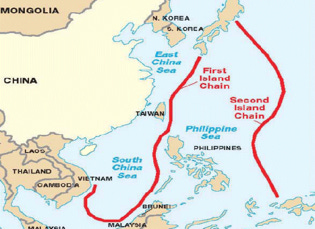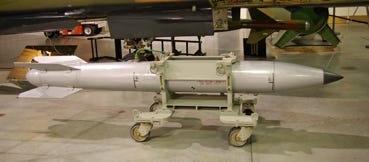Are Critical National Interests At Stake In Taiwan
Should we build American air, sea, and land bases on Taiwan?
The following article represents the opinions of the author.
In a recent issue of the Washington Times James Fanell of the Geneva Centre for Security Policy, and Bradley A. Thayer of the Center for Security Policy made a case for the United States supporting Taiwan by deploying air, sea, and land forces on Taiwan. Their article was supported by a vow made by President Biden that U.S. military forces would defend Taiwan if it were invaded by China.
Many of us are too busy making ends meet to learn about the issues and geography of yet another foreign country in danger, but since President Biden said our sons and daughters will be sent to fight and die on a battlefield in Taiwan, let us examine the premises that Fanell and Thayer believe support that decision.
Their first argument is that “the current health of the U.S. economy depends on Taiwanese chip production.” My article, “The Chip War With China,” in AND Magazine debunks that statement. Not only is the manufacture of computer chips an ecosystem containing many more countries besides Taiwan, but U.S. sanctions on China have also resulted in major players in that ecosystem – including Taiwan – building facilities in the United States. It will take time and money, but most elements of chip production will soon be in America.
The second argument is that Taiwan “occupies critical geopolitical territory that serves to contain the Chinese navy," provide potential bases for strikes against military facilities and mine Chinese ports, should war come, and serve as an outpost for the U.S. intelligence community.” The two authors are referring to what some call “The First Island Chain,” and Taiwan is one of those islands. A look at a map shows is not a chain that locks China inside because their navy can simply sail between the islands. As far as building American bases in Taiwan to attack China, those bases would be within easy range of mainland China’s land-based missiles and will be under instant and devastating attack “should war come,” as the authors phrase it.
The third point is confusing, and might be based on their sentence, “Taiwan is a flourishing democracy that demonstrates that China could be as well if freed from the tyranny of the CCP.” The point concludes with, “Given the invasion of Taiwan could occur at any time and might come as soon as this year, drastic actions must be taken to deter the Chinese.” The authors are saying we should rush to put our military forces on Taiwan in order to defend its democracy. That statement is the same as those that led us into wars in jungles and deserts in the name of nation-building and the war on terror.
Their fourth argument is more direct. It states, “Taiwan is a symbol for U.S. allies of its willingness to resist the CCP’s expansion. It was, like West Berlin, such an icon during the Cold War, and it remains so today.” References to the Cold War are designed to stir nostalgia for our successful containment of the Soviet empire. That containment put us into the jungles of Vietnam, a Cold War battle that cost 50,000 American lives on a bloody battlefield we abandoned. Are the authors telling us that another battle in the Far East, this time in Taiwan, will be more successful?
The fifth and final point is another Cold War reference. It states, “Taiwan was an important ally during the Cold War — this shared history must be remembered now to understand how valuable Taiwan was to U.S. national security.” The authors then mention the “new Cold War with China” and recommend the United States, Australia, India, and Japan should deploy their air, sea, and land forces to the island in the name of deterrence.
Besides, four powerful nations deploying “their air, sea, and land forces to the island,” the most astonishing suggestions that Fanell and Thayer urge upon Washington appear at the conclusion of their article. First, they want the United States “to recognize Taiwan as a state and extend deterrence to it as it did during most of the Cold War.” Then, even more astonishing, the U.S. “should deploy B-61 tactical nuclear weapons to the region, including Taiwan, to deter an attack or escalation to higher levels of conflict if deterrence fails.” The authors add that putting nuclear weapons on Taiwan would “increase Taipei’s ability to defend itself and to serve as a nuclear tripwire.”
What Fanell and Thayer are saying is that nuclear weapons based in Taiwan will be available in the event of a Chinese invasion and that their use will be a tripwire for a strategic nuclear exchange between America and China that will immediately start (and end) World War III. Not only would our troops based in Taiwan be blown up along with those of three other nations, but American and Chinese cities would also be incinerated. Does that read like another chapter of Doctor Strangelove?
The article by Fanell and Thayer fails the stern test posed by retired Marine Lt.Gen. Gregory Newbold in Task & Purpose. It states – Wars must be waged only with stone-cold pragmatism, not idealism, and fought only when critical national interests are at stake. Since the United States has no critical national interests in Taiwan, here are a few points that might give communist China pause before they consider invading Taiwan.
First, enable Taiwan to defend itself by selling them the weapons they need to make an invasion so difficult that Beijing might delay it indefinitely. Last year Taiwan earned $185.3 billion (38.8% of its exports) by selling its products to communist China. So they surely can afford the very best weaponry.
Second, convince President Biden to stop the State Department from blocking sanctions that weaken the war machine of the Communist Chinese Party (CCP). The Biden administration is bent on restoring close diplomatic relations with the CCP, a criminal organization that declared war on the United States in 1999 with the publication of Unrestricted Warfare, a book by two Chinese army colonels. This blockage is caused by Secretary of State Blinken’s memory of Biden’s meeting Xi Jinping, China’s dictator for life, in Bali in late 2022. Blinken and Biden somehow believe that diplomacy will end Xi’s agenda of aggression. It brings to mind the 1938 meeting of Britain’s Prime Minister with Hitler and Chamberlain’s subsequent announcement of “peace in our time.” We know how that worked out.
Finally, the CCP’s generals have made it clear that after they assimilate Taiwan a war with America is “inevitable.” There are some steps that could convince them otherwise. Those steps, resisted by every department and agency of the Biden administration, include:
Hardening our electrical grid against an EMP attack or an attack by Chinese saboteurs. The vulnerability of our electrical grid has been proven many times, but the Federal Energy Regulatory Commission has been unable to convince our electric utilities (or their lobbyists) to do it. A successful EMP attack will kill 90% of all Americans.
Stopping the thousands of Chinese illegal immigrants crossing our southern and northern borders. Those potential saboteurs and assassins are unaccompanied males of military age, dressed similarly, traveling in groups, and carrying thousands of dollars.
Ending funding for DEI and woke programs in our military and removing senior officers who promote DEI. We must replace them with those who believe promotions should be solely based so on merit, not race. End drag queen shows and the entire woke agenda. Being woke marks the ideological corruption of our military leadership whose policies have demoralized our soldiers, sailors, and airmen, and are the reason enlistments are disappearing.
Two Chinese countries are probably going to have a war in the Far East. Please explain to me why we should send our children into that distant fight.
B-61 nuclear gravity bomb







It's astonishing to hear the utter lack of sound reasoning on offer by the Taiwan hawks. Here's the truth. We gave up on Taiwan 43 years ago. We ended our mutual defense treaty and derecognized them diplomatically, in favor of diplomatic relations with China. We then spent the next 40 years building China into an unprecedented monolith that is now set to establish itself as THE global hegemon. Militarily, it's our only real rival on the planet and they field very competitive weapons systems in many categories that we simply have never faced before.
I've seen DCS simulations of battles w China over Taiwan and protecting Okinawa or Guam and the truth is that while we may beat them initially, that will require huge losses. Think dozens of naval warships, hundreds of aircraft and thousand and thousand of military personnel. And that's in the firs week. Fyi, there is a non-zero chance that it will be much worse for us if Chine decides to use one of it's 'assassin's mace' weapons against us like an EMP or killer satellites that take out ours. Who knows?
But the idea that 40 years after letting Taiwan go, now we should fight? Eff that. That's insane. There is a reason we don't have a treaty to defend Taiwan. Funnily, if you read the rationale offered for doing so above, much of it comes down to the massive egos of our Western elites who do not want to face the very real limitations on their power. They can't admit we can't win a war over Taiwan, which of course we can't over any sustained period of time. Like we could maybe get them to a standoff initially but we would eventually be pushed back. It's their backyard - it's 8000 miles away from us. Just think about the logistics of fighting the largest nation and military on earth?
Good points to ponder.
Isn't it amazing what a lack of leadership in Washington, DC has done to the fine balance of power world wide.